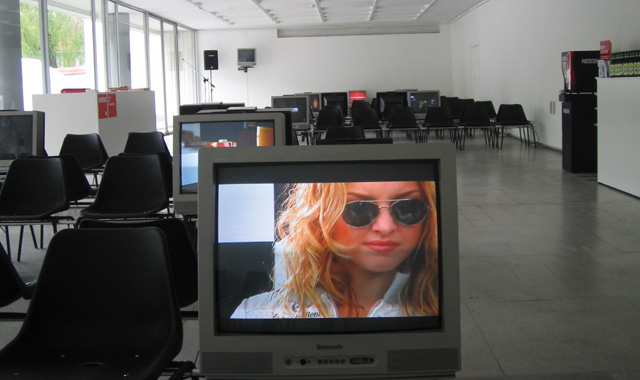
Artists:
Peter Aerschmann, Stefan Altenburger, Emmanuelle Antille, Balkan TV, Stefan Banz, Ursula Biemann, Olaf Breuning, collectif_fact, COM & COM, Decosterd & Rahm, Mark Divo, Christoph Draeger, Yan Duyvendak, Nicolas Fernandez, Sylvie Fleury, Iris Gallarotti, Laurent Goei, Marica Gojevic, Bob Gramsma, Herve Graumann, Andres Lutz / Anders Guggisberg, Thomas Hirschhorn, Teresa Hubbard & Alexander Birchler, Laurence Huber, Felix S. Huber, San Keller, Sabina Lang / Daniel Baumann, Jorg Lenzlinger & Gerda Steiner, Jerome Leuba, Zilla Leutenegger, Elena Montesinos, Frederic Moser & Philippe Schwinger, Gianni Motti, Bessie Nager, Shahryar Nashat, Yves Netzhammer, Nathalie Novarina & Marcel Croubalian, Luc Peter, Daniel Pflumm, Marco Poloni, Anne-Julie Raccoursier, Christophe Rey, Pipilotti Rist, Ugo Rondinone, Rebecca Sauvin, Katja Schenker, Daniel Schibli, Erik Steinbrecher, Sidney Stucki, Susann Walder, Ingrid Wildi.
Curator: Simon Lamuniere
Among the large number of spaces specially dedicated to presenting videos, internet sites and multimedia projects, Swiss Art Videolobby is a unique video library which is conceived as real installation by curator Simon Lamuniere.
For the past ten years Swiss artists, and especially those working in video, are among the most dynamic, singular and original. In Swiss Art Videolobby the emphasis is placed on the ‘younger generation’ of the 1990s and 2000s, who are no longer ‘pioneers’ or ‘musketeers’ of video, they have succeeded in finding their own language and developing original themes that make them true authors.
As an installation exposition seeks confrontation between the whole and the parts, architecture and furniture, video and its perception.
In the space of the Videolobby, sixteen rows of seats are placed in parallel, alternatively back to back and face to face. Seven chairs are placed by a monitor set on a small table. A hostess responds to the public’s questions and hands them the DVDs. Two other monitors show looped videos; they are positioned at a certain height, one over the counter, the other discreetly in corner near a high table. There is also a vending machine dispensing drinks, a basket of fruit and daily newspapers available for the viewers.
The general display suggests a general waiting room or an airport lounge.
The reference to this sort of standardised space is, of course, not completely innocent. With the fear of attacks and the crisis in air travel, people‘s presence is constantly controlled, their movements watched, their luggage searched. If they are there in the first place it is with the intention of going somewhere for leisure or business. These spaces are transitional, and when passing through them everything becomes a source of interest. Because one has to wait, the smallest activity and detail catches one‘s attention. Thoughts circulate freely, by association, a little like at an exhibition. Reality is perceived differently.
A lobby space is simultaneously constraining and open: constraining because the furniture is stationary and organised, open because the public can sit as they choose. The formal meets the friendly and informal.